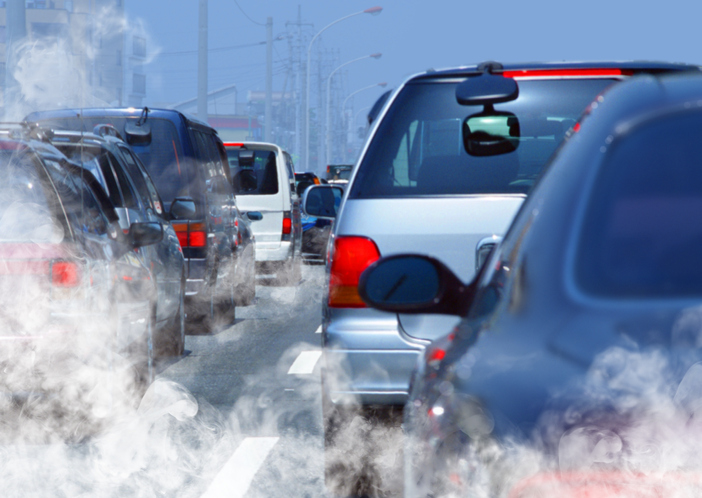Air Pollution’s Impact on Mental Health
Air pollution is a major environmental health risk — the links between air pollution and health conditions such as respiratory and cardiovascular diseases are well established. Though less well-understood, there is substantial evidence that air pollution also impacts mental health.
Past research has associated air pollution with higher levels of stress, psychological distress, increased risk of dementia and Alzheimer’s and depression. Other research has linked short-term exposure to peaks in air pollution with an increased risk of death among people with serious mental illness. New research specifically points to impacts on the brains and mental health of children.

Links Between Air Pollution and Mental Health Symptoms
For example, a large study of people in the U.S. and Denmark found that exposure to air pollution “is significantly associated with increased risk of psychiatric disorders,” including depression, schizophrenia, bipolar disorder and personality disorder. (Kahn, et al) While studies have found associations between air pollution and mental health problems, how it might influence mental health is not well understood. The authors of the U.S. and Danish study suggest their research points to neuroinflammatory mechanisms linking air pollution and psychiatric consequences.1
A recent review looked at more than 100 studies on the effects of outdoor air pollution on mental health and regions of the brain that regulate emotions, focusing on the hippocampus, amygdala and prefrontal cortex. The researchers found that 73% of the studies reported higher mental health symptoms and behaviors in humans and animals after exposure to higher-than-average levels of air pollution. 2 The lead author of the study, Clara G. Zundel, Ph.D., concluded in a World Economic Forum report: “People who breathe polluted air experience changes within the brain regions that control emotions, and as a result, they may be more likely to develop anxiety and depression than those who breathe cleaner air.” 3
And a study from researchers at Harvard, published in March 2023, adds to the evidence connecting exposure to air pollution (small particulate matter (PM2.5), nitrogen oxide and nitrogen dioxide) to increased risk for dementia.4

Children and Adolescents
Another recent study looked at potential impacts on children and adolescents who may be particularly vulnerable as they experience critical periods of brain development. The review of research found evidence that air pollution is associated with an increased risk of depression symptoms and suicidal behaviors. They also found, through neuroimaging studies, evidence for associated structural and functional changes in the brain.5
The findings of the large population study mentioned above suggest that poor air quality during the early years of an individual’s life increases the risk of psychiatric disorders, including bipolar disorder, schizophrenia, personality disorder, and major depression).1
Exposure to air pollution may also exacerbate existing mental health conditions among children. A study published in Environmental Health Perspectives found an association between short-term exposure to elevated levels of air pollution and increased emergency room psychiatric visits among children.6
References
- Khan A, Plana-Ripoll O, Antonsen S, Brandt J, Geels C, Landecker H, et al. (2019) Environmental pollution is associated with increased risk of psychiatric disorders in the US and Denmark. PLoS Biol 17(8): e3000353. https://doi.org/10.1371/journal.pbio.3000353
- Zundel, C. G., Ryan, P., Brokamp, C., Heeter, A., Huang, Y., Strawn, J. R., & Marusak, H. A. (2022). Air pollution, depressive and anxiety disorders, and brain effects: A systematic review. Neurotoxicology, 93, 272–300. https://doi.org/10.1016/j.neuro.2022.10.011
- Zundel, C.G. 2022. This is the impact of air pollution on your brain and mental health. World Economic Forum, Nov. 29, 2022
- Wilker, E.H., Osman, M. Weisskopf, M.G. Ambient air pollution and clinical dementia: systematic review and meta-analysis. BMJ 2023;381:e071620
- Xie, H., et al. 2023. Affective disorder and brain alterations in children and adolescents exposed to outdoor air pollution. Journal of Affective Disorders, Vol. 331, June 15, 2023, Pages 413-424. https://doi.org/10.1016/j.jad.2023.03.082
- Brokamp, C. Strawn, J.R., Beck, A.F., Ryan, P. 2019. Pediatric Psychiatric Emergency Department Utilization and Fine Particulate Matter: A Case-Crossover Study. Environmental Health Perspectives. Vol. 127, No. 9. https://doi.org/10.1289/EHP4815
